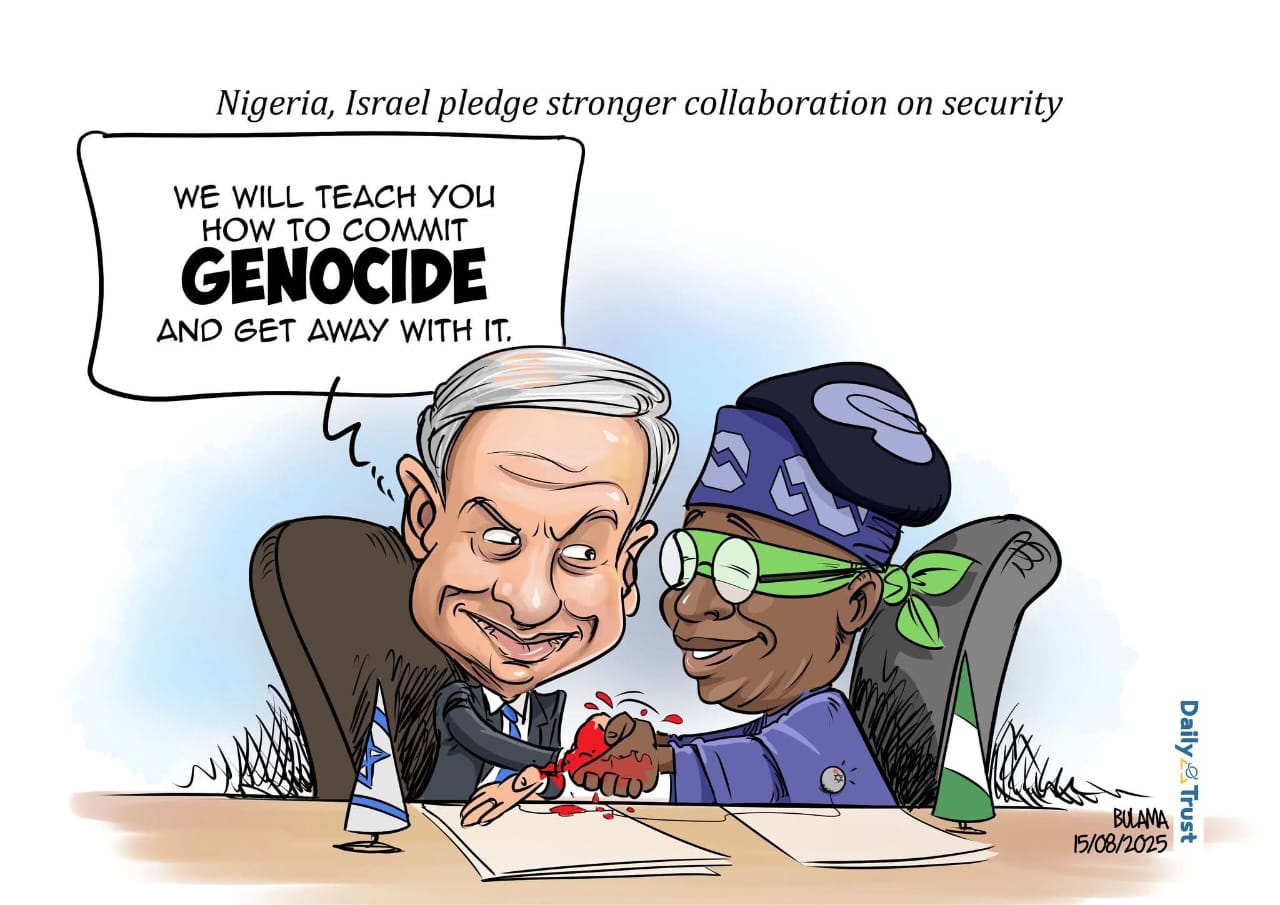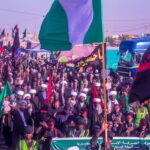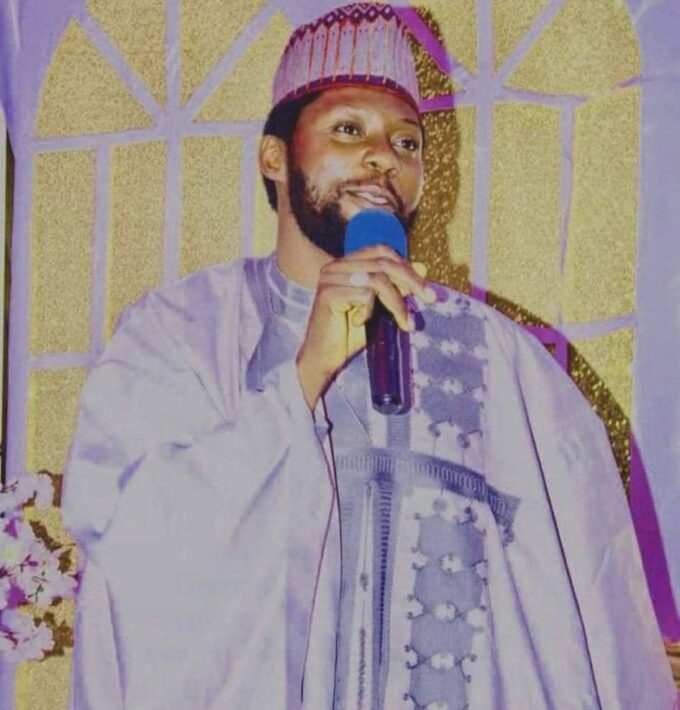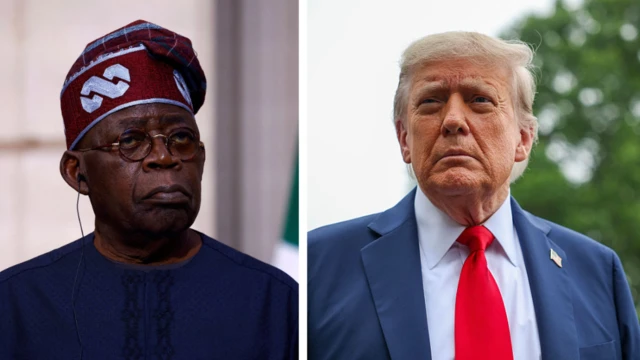The Nigerian government was reported to have signed or about to signed a security agreement with a foreign power. This time it is Israel, an occupier regime notorious for genocide and sundry crimes against humanity. Even as the announcement was delivered in the sugary language of diplomacy. There were smiles, handshakes, official photos, and a communiqué announcing “cooperation on security, intelligence, and counter-terrorism training.” To the untrained ear, it sounds like progress. To the weary Nigerian who has heard this story too many times, it is another confession of failure, delicately wrapped in ribbons. Instead of protecting its citizens as the Constitution commands, the Nigerian state is outsourcing its most sacred responsibility, as though the protection of life and property were an errand that can be subcontracted abroad.
Let us be clear: Section 14(2)(b) of the Nigerian Constitution states without ambiguity that the “security and welfare of the people shall be the primary purpose of government.” Not secondary. Not a footnote. Primary! The same Constitution in Section 33 guarantees every Nigerian the right to life, and in Section 17 it speaks of welfare, justice, and dignity as foundations of governance. These are not flowery phrases. They are duties. When a government spends trillions of naira yet cannot keep its citizens safe, when it cannot even secure highways and villages, when citizens bury loved ones daily while the treasury bleeds for “security votes,” then that government is guilty not just of incompetence but of betrayal. And when that same government, already bloated with defence budgets, turns around to sign deals with foreign powers to do the job it has failed to do, then the betrayal acquires a deeper stench.
Israel is not an innocent party in world affairs. It is not Switzerland or Sweden offering technical expertise. It is a state defined by occupation and militarism, a country that has built its defence industry on the suffering of Palestinians. The world knows this. Gaza’s skies know it by the whine of drones and the thunder of bombs. Lebanon knows it by the scars of invasions. Syrians know it by airstrikes. Bahrain knows it by surveillance technology exported to authoritarian regimes. That is the country we now invite to redesign Nigeria’s security architecture? The fox that raids the chicken house at night is now hired to guard the chickens by day. This is not just irony. It is absurdity parading as lunacy.
But before we drown ourselves in the sins of Israel, let us first confront our own house of shame. For the real scandal is not that Israel is willing to sell us services. The real scandal is that Nigeria is willing to buy. In the past five years alone, Nigeria has budgeted over ₦10 trillion for defence and security. That is an average of ₦2 trillion per year. Break it down: ₦167 billion every month, ₦38 billion every week, more than ₦5 billion every single day. Five billion naira daily! Imagine what ₦5 billion can do in education, in healthcare, in electrification, in agriculture. Imagine 365 days of such spending, and yet the same country cannot keep farmers safe on their farms, cannot keep children safe in their schools, cannot keep passengers safe on their highways. What happened to the trillions? Who swallowed them? Who chewed the bone and left the marrow to rot?
And let us not deceive ourselves about numbers. Nigeria is not short of soldiers. The armed forces officially count over 200,000 personnel. Add to that the police, civil defence, customs, immigration, and local vigilantes, and the security apparatus is formidable. By contrast, estimates put Boko Haram, ISWAP, and the various bandit groups at perhaps 30,000 to 40,000 fighters combined. That is one insurgent for every six or seven members of the armed forces. And yet, the balance of terror favours the ragtag criminals. They ride motorcycles. They wield AK-47s. They record videos in the bush. And still, they seize villages, abduct children, and demand ransoms. The Nigerian state, with its trillions and its battalions, trembles before them. A giant with feet of clay, bowing before grasshoppers.
Behind these numbers lie broken families and shattered lives, mothers in Zamfara, still waits for their daughters abducted on their way from school. In Kaduna, families buried their loved ones killed on the Abuja–Kaduna highway. In Benue, farmers now live in an IDP camp, their houses burned, their loved ones killed. A farmer recounting his ordeal said: “I planted yam for twenty years,”. “Now I plant nothing. I eat government rice.”
In Katsina, 317 schoolgirls were abducted in Jangebe in a single night. Parents wailed, leaders issued statements, ransom was paid, and life continued as though mass abduction were as normal as rainfall. Every statistic in Abuja is a corpse in a village, a hunger in a household, tears and anguish in the night.
It would be forgivable if outsourcing security actually solved problems. But history across Africa shows it does not. Mali invited French troops in 2013. They stayed nearly a decade. Billions of euros spent, thousands of soldiers deployed, and yet criminals still roamed. The French left in disgrace, chased out by resentment, leaving Mali still bleeding. Central African Republic invited Russian mercenaries. They fought rebels, yes, but they also looted gold mines, entrenched their influence, and left ordinary people still unsafe. In Somalia, Americans and African Union troops have been fighting Al-Shabaab for decades. Billions spent. Still Al-Shabaab bombs markets and mosques. Mozambique invited Wagner mercenaries to fight insurgents in Cabo Delgado. Within months, the mercenaries withdrew after suffering losses, leaving chaos behind. Foreign involvement in Africa’s security rarely ends in stability. It ends in dependency, disillusion, and exploitation.
Nigeria now flirts with the same fate. By inviting the criminal enterprise of Zionism, which as another name for Israel, into our security architecture, we risk turning sovereignty into a rental property. Today, it is training and intelligence. Tomorrow, it may be drones, mercenaries and military bases. And one day we will wake up to discover that our independence has been pawned. The chicken-and-fox scenario may not end in feathers scattered on the ground. It may mutate into something worse: chicken pox diplomacy, an infection that spreads through the body politic, leaving us scratching, weak, and scarred. The government thinks it is buying protection. What it is really buying is humiliation.
Some will say, “But what choice do we have? Our house is burning.” Yes, the house is burning. But who lit the fire? Who pocketed the budget meant for fire extinguishers? Who left the hydrants dry? Who built palaces while villages burned? We cannot set our own house ablaze and then call foreign firefighters to live with us permanently. A responsible state must answer to its citizens, not to foreign powers.
The Constitution is not silent here. It declares that sovereignty belongs to the people of Nigeria. This means that the people, not the government, are the true owners of the state. If the government fails in its primary duty, the people are within their constitutional right to demand accountability. They can demand inquiries into defence budgets. They can sue in courts. They can organize assemblies. They can insist through civil action that every naira is accounted for. And when leaders hide behind security secrecy to shield corruption, the people must pierce that veil. Democracy without accountability is democrazy.
We must listen to the testimonies of victims not as pity but as indictment. Mothers whose daughters are gone. Fathers whose sons are buried. Children growing up in camps. Teachers watching classrooms emptied by kidnappers. These voices must become evidence in the people’s court. And that court must sit daily until justice is done.
It is not treason for citizens to organize for their own safety when the state abdicates. It is survival. Communities can form lawful self-defense units under state authority. Youth can demand training and employment in security. Farmers can insist on armed escorts. Lawyers can drag the state to court. Activists can march. Clerics can preach. The message must be loud: government may fail, but people must not surrender.
For let us face the absurdity squarely. Nigeria spends ₦5 billion daily on security, yet cannot prevent kidnappers from blocking a highway. Nigeria pays generals fat salaries, yet schoolgirls are abducted by the hundreds. Nigeria has one soldier for every six insurgents, yet villages fall weekly. What is this if not a theatre of betrayal?
And betrayal has a price. When people lose faith in their government, they turn to alternatives. Some turn to self-help. Some to armed groups. Some to separatism. Some to despair. None of these is healthy for a nation. Nigeria must not drift to that point. It is the duty of citizens to demand accountability before collapse becomes irreversible.
The lesson of Karbala tells us that when rulers betray trust, the people must rise in defence of truth, even at great cost. The lesson of South Africa’s struggle tells us that when citizens demand accountability persistently, even entrenched systems bend. The lesson of our own #EndSARS movement tells us that young people have power when they unite. These lessons must not be wasted.
Israel cannot save Nigeria. France could not save Mali. America could not save Somalia. Russia could not save CAR. Outsourcing sovereignty is like selling your umbrella to buy a raincoat while living in a floodplain. You will still drown.
So let the truth be spoken without fear: the government has failed in its constitutional duty to protect life. It has betrayed its citizens. It now seeks to hide its shame behind foreign agreements. But no ribbon can cover rot. Nigerians must not accept chicken pox diplomacy as destiny. We must demand accountability, transparency, and constitutional obedience. We must insist that every naira spent on security be accounted for in lives saved, not in contracts signed.
And if the government refuses, then the people must constitutionally, peacefully, but firmly take their destiny into their own hands. A government that will not secure life forfeits its moral claim to govern. And a people that will not secure their own lives will perish.
In the end, no nation survives by renting its spine. A government that cannot defend its people has already confessed its failure, no matter how many communiqués it signs or how many photo-ops it stages. The Constitution is clear: security of life and property is the first duty of the state. If those in power cannot shoulder that duty, then the honourable path is not to drag the fox into the hen house, but to step aside and let true patriots guard the flock. Anything less is not governance. It is betrayal wrapped in diplomacy, and betrayal always bleeds.
A nation that trusts the fox to guard its chickens will soon discover that diplomacy, like disease, can itch, blister, and kill. Welcome to chicken pox diplomacy.














Leave a comment